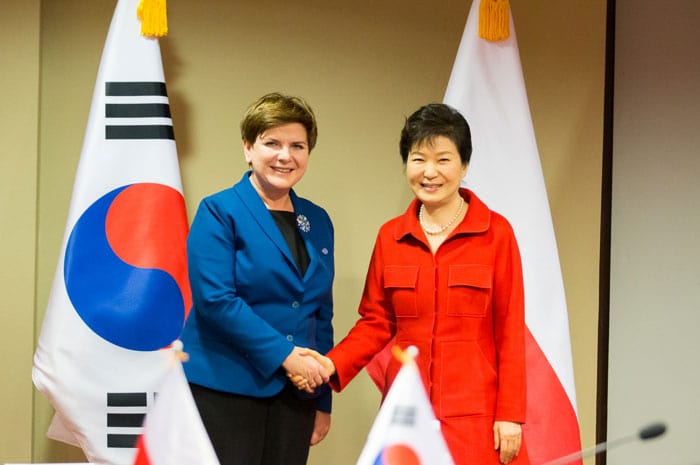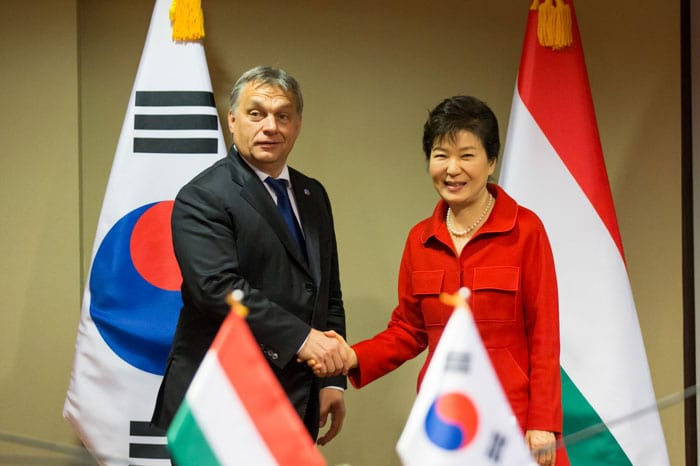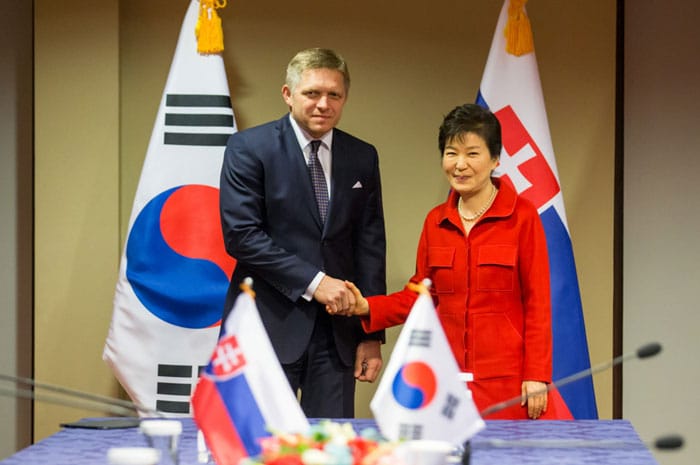
President Park Geun-hye (right) and Polish Prime Minister Beata Szydlo hold a summit on Dec. 3 in Prague.
President Park Geun-hye held a series of bilateral summits with the prime ministers of Poland, Hungary and Slovakia on Dec. 3 in Prague.
In the meeting with Polish Prime Minister Beata Szydlo, President Park asked for cooperation so that internationally competitive Korean firms could participate in large-scale infrastructure improvement projects in Poland, such as railroads or Internet networks, projects on which the Polish government is currently working.
Prime Minister Szydlo said in response that, “Poland is putting emphasis on developing new technologies, re-industrialization and exploring new markets at the national level. We are striving to model Korea, as the country has achieved rapid economic growth.”
“Thanks to Cho Seong-jin’s recent victory at the International Fryderyk Chopin Piano Competition, Koreans’ interest in Poland has been growing. I hope such cultural exchanges will increase in the future,” said President Park.
“Just like the connection between Cho Seong-jin’s performances and the music of Chopin, I hope cultural exchanges between our countries can deepen,” said Prime Minister Szydlo.
In regard to cooperation on defense, President Park said, “Bolstered cooperation on security and national defense is important to develop our bilateral relationship in a future-forward manner. I would like to ask for your interest in and cooperation on this, so that bilateral cooperation in the defense sector can be thoroughly developed since it began with the export of Korea-made K-9 self-propelled artillery units last year.”

President Park Geun-hye (right) and Hungarian Prime Minister Viktor Orban hold summit talks on Dec. 3 in Prague.
In a meeting with Hungarian Prime Minister Viktor Orban, President Park said that she hopes that “the second Korea-Hungary joint economic committee can open in the near future.” She also asked for the Hungarian leader’s cooperation so that Korean companies could take part in ongoing subway renovations and other large-scale infrastructure projects in Hungary.
Prime Minister Orban said in response that, “Hungary also has great hopes for the commencement of a second Korea-Hungary joint economic committee. I hope that our two countries will be able to discuss various measures in order to expand cooperation across many industries and many sectors of the economy.”
The Hungarian leader continued by saying, “I would like to welcome the systemic foundation laid by our two countries for cooperation on national defense and the defense industry thanks to the signing of an agreement between the two countries to protect confidential military information.”
“I hope that in the near future our countries will be able to sign memorandums of understanding in the defense industry and on military supplies so that cooperation can expand, such as Hungary’s purchase of multi-purpose helicopters from Korea,” Prime Minister Orban added.

President Park Geun-hye (right) and Slovak Prime Minister Robert Fico meet in Prague on Dec. 3.
During the Korea-Slovakia summit, Slovak Prime Minister Robert Fico asked for President Park to encourage more Korean firms that worked on Incheon International Airport to participate in the ongoing construction plans for Bratislava Airport.
President Park told the Slovak leader that she would inform the firms about the new airport construction project so that both countries could establish a win-win relationship.
Prime Minister Fico told President Park that he wishes to discuss Korea-Slovak cooperation on nuclear energy at the joint economic committee that will take place in the first half of next year.
President Park told the Slovak leader that Korea will closely cooperate with Slovakia when plans for the new atomic power plant construction project become concrete.
She told the Slovak leader that about 90 Korean firms are operating in Slovakia and contributing to the economy there, and she proposed signing an agreement on economic cooperation and the formation of a joint economic committee.
Finally, Prime Minister Fico told President Park that he hopes she will be able to visit Slovakia so that both sides could discuss in detail measures to bolster cooperation.
By Wi Tack-whan, Yoon Sojung
Korea.net Staff Writers
Photos: Cheong Wa Dae
whan23@korea.kr























